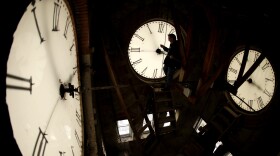The Texas Senate has passed a bill that would move the state to permanent daylight saving time, ending the long-standing tradition of “springing forward” and “falling back” each year.
House Bill 1393, authored by Republican Rep. Will Metcalf of Conroe, aims to eliminate the time change by keeping Texas on daylight saving time (DST) year-round. The Senate passed the bill Thursday afternoon on a vote of 27 to 4. The measure cleared the Texas House last month; it now heads to Gov. Greg Abbott’s desk for approval.
Sen. Paul Bettencourt, a Republican from Houston, argued that extending daylight into the evening hours would better suit Texans “in this modern economy and modern age.”
“The bill would provide numerous benefits to Texans,” Bettencourt said. “It’s very difficult to use that hour before an 8 a.m. start for school or work very effectively, but you can use the several hours later, up through dusk.”
Under the bill, the entire state would observe daylight saving time permanently. But the shift can’t happen without federal action. Currently, federal law only allows states to opt out of DST entirely, not but not adopt it year-round. That means even if Abbott signs HB 1393 into law, it won’t take effect unless Congress changes federal timekeeping rules.
“This is really all weighing upon the federal government,” Bettencourt said.
On Thursday, Democratic Sen. Nathan Johnson of Dallas voiced opposition to HB 1393. He referenced the country’s brief experiment with permanent DST in 1974, when President Richard Nixon signed a bill implementing it in response to the national energy crisis. The policy quickly drew public backlash and was ultimately abandoned before the year was over.
“The question is: Do we go with daylight savings time and always be an hour ahead of where we established our clock centuries ago? Or do we go back to what we’ve done for centuries?” Johnson said. “I would argue that we should not adopt daylight savings time.”
In recent years, similar measures in Texas have stalled before reaching Abbott’s desk. The governor has previously indicated support for making DST permanent in the state. At least 18 other states – including Florida, Mississippi, Oklahoma and Alabama – have passed similar legislation, all waiting for federal approval. In Congress, the Sunshine Protection Act, which would allow states to adopt DST year-round, has been introduced five times, including this year. Despite repeated efforts, the bill has yet to gain traction.
Public opinion appears to be divided. A 2019 poll by the Associated Press and the National Opinion Research Center at the University of Chicago found that 40% of Americans favored staying on standard time year-round, while 31% preferred permanent DST. Meanwhile, 28% said they preferred keeping the current system of switching clocks twice per year.





